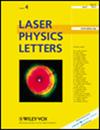经典驱动辅助量子进化加速
IF 1.4
4区 物理与天体物理
Q3 OPTICS
引用次数: 0
摘要
在这项研究中,我们提出在开放系统中利用外部经典驱动场加速量子比特的演化。结果表明,量子速度极限由驱动强度、初始激发态的种群和初始态的量子相干性决定。在马尔可夫体系中,开放系统的演化会随着驱动强度的增加而加速;而在非马尔可夫体系中,开放系统的演化会呈现周期性的加速和减速。此外,在马尔可夫体系和非马尔可夫体系中,初始激发态的群体和初始状态的相干性总是能使量子速度极限约束变得更紧。本文章由计算机程序翻译,如有差异,请以英文原文为准。
Classical driving-assisted quantum evolution speedup
In this study, we propose accelerating the qubit evolution using external classical driving fields in open systems. The results show that the quantum speed limit is determined by the driving strength, population of the initial excited state, and quantum coherence of the initial state. In the Markovian regime, the evolution of the open system will be accelerated by increasing the driving strength, while in non-Markovian regime, the evolution of the open system will present acceleration and deceleration periodically. Moreover, in both Markovian and non-Markovian regime, the population of the initial excited state and the initial-state coherence always can make the quantum speed limit bound tighter.
求助全文
通过发布文献求助,成功后即可免费获取论文全文。
去求助
来源期刊

Laser Physics Letters
物理-仪器仪表
CiteScore
3.30
自引率
11.80%
发文量
174
审稿时长
2.4 months
期刊介绍:
Laser Physics Letters encompasses all aspects of laser physics sciences including, inter alia, spectroscopy, quantum electronics, quantum optics, quantum electrodynamics, nonlinear optics, atom optics, quantum computation, quantum information processing and storage, fiber optics and their applications in chemistry, biology, engineering and medicine.
The full list of subject areas covered is as follows:
-physics of lasers-
fibre optics and fibre lasers-
quantum optics and quantum information science-
ultrafast optics and strong-field physics-
nonlinear optics-
physics of cold trapped atoms-
laser methods in chemistry, biology, medicine and ecology-
laser spectroscopy-
novel laser materials and lasers-
optics of nanomaterials-
interaction of laser radiation with matter-
laser interaction with solids-
photonics
 求助内容:
求助内容: 应助结果提醒方式:
应助结果提醒方式:


